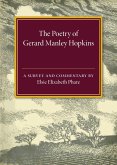In his lifetime, Gerard Manley Hopkins was known as a poet only by a small circle of his friends. More than any other major Victorian writer, he was recovered and presented as a poet to modern readers by editors and scholars of the first half of the twentieth century. This book analyzes how and to what extent the presuppositions of these critics have dictated the modern conception of Hopkins's work. Bender seeks to dispel, once and for all, the notion that Hopkins was a naïf poet. He provides an analysis of classical Greek and Latin rhetoric relative to the classical background of Hopkins's style and the structure in his poetry. He maintains that especially in Hopkins's more extreme work, such as "The Wreck of the Deutschland," there are precedents for the structure of the poem itself, the structure of the sentences within the poem, and its sensual and obscure imagery in the classical literature that Hopkins knew so well. Bender's study suggests two highly controversial positons: first, that although Hopkins is one of the most original voices in English, his poetry is within a tradition insufficiently recognized by modern critics; and second, that the effect of careful and sympathetic study of classical literature can induce quite the opposite of a neoclassical style in English.








